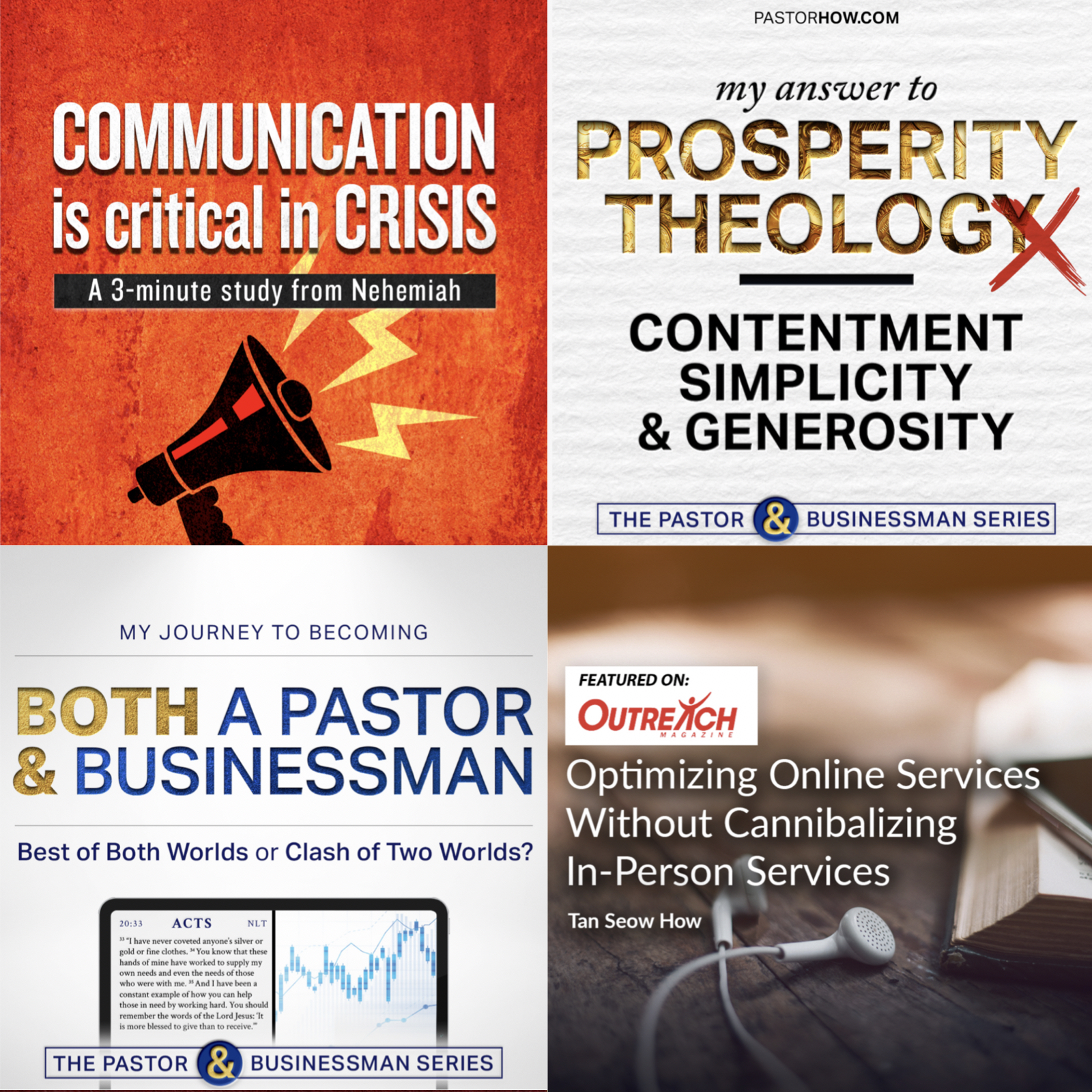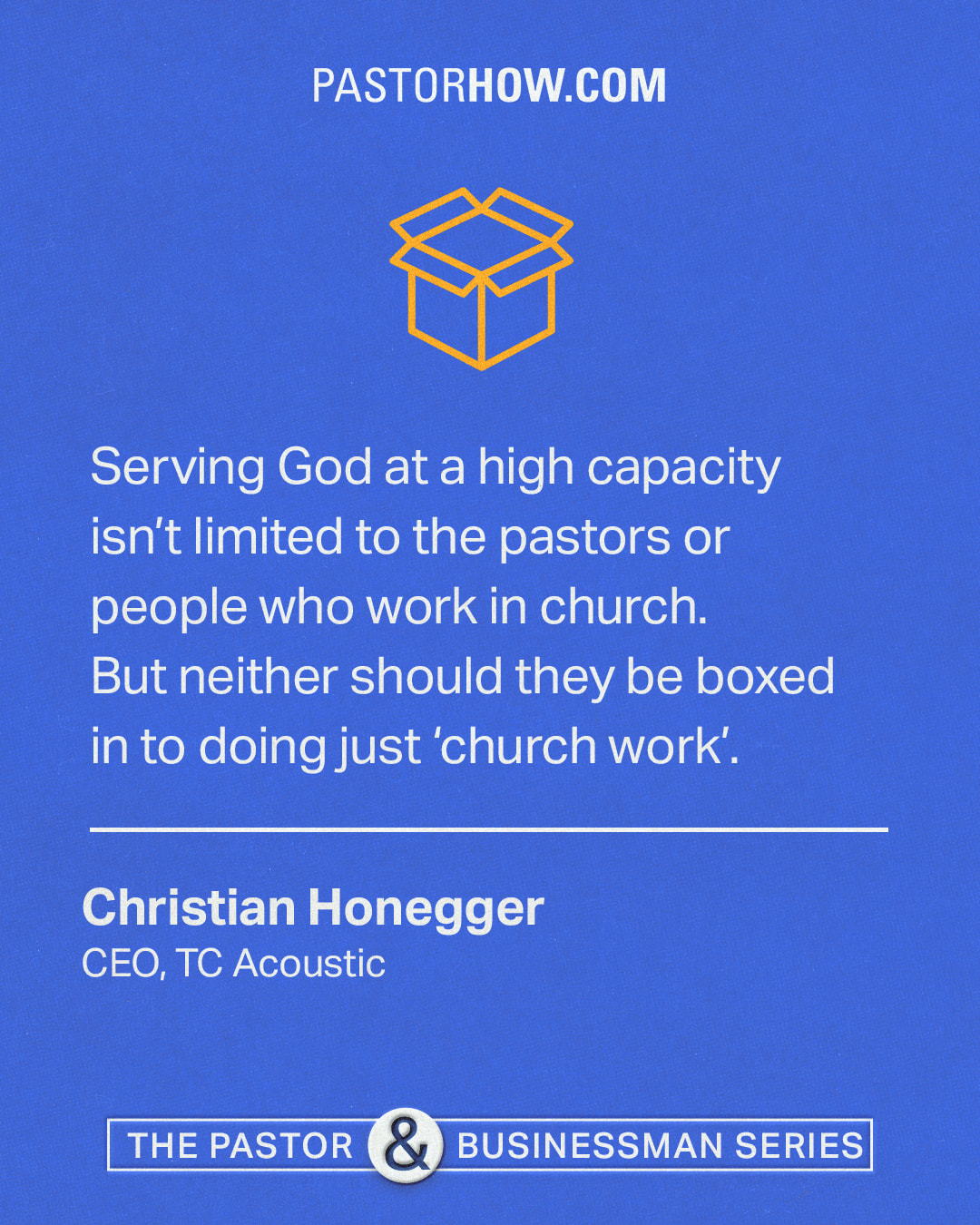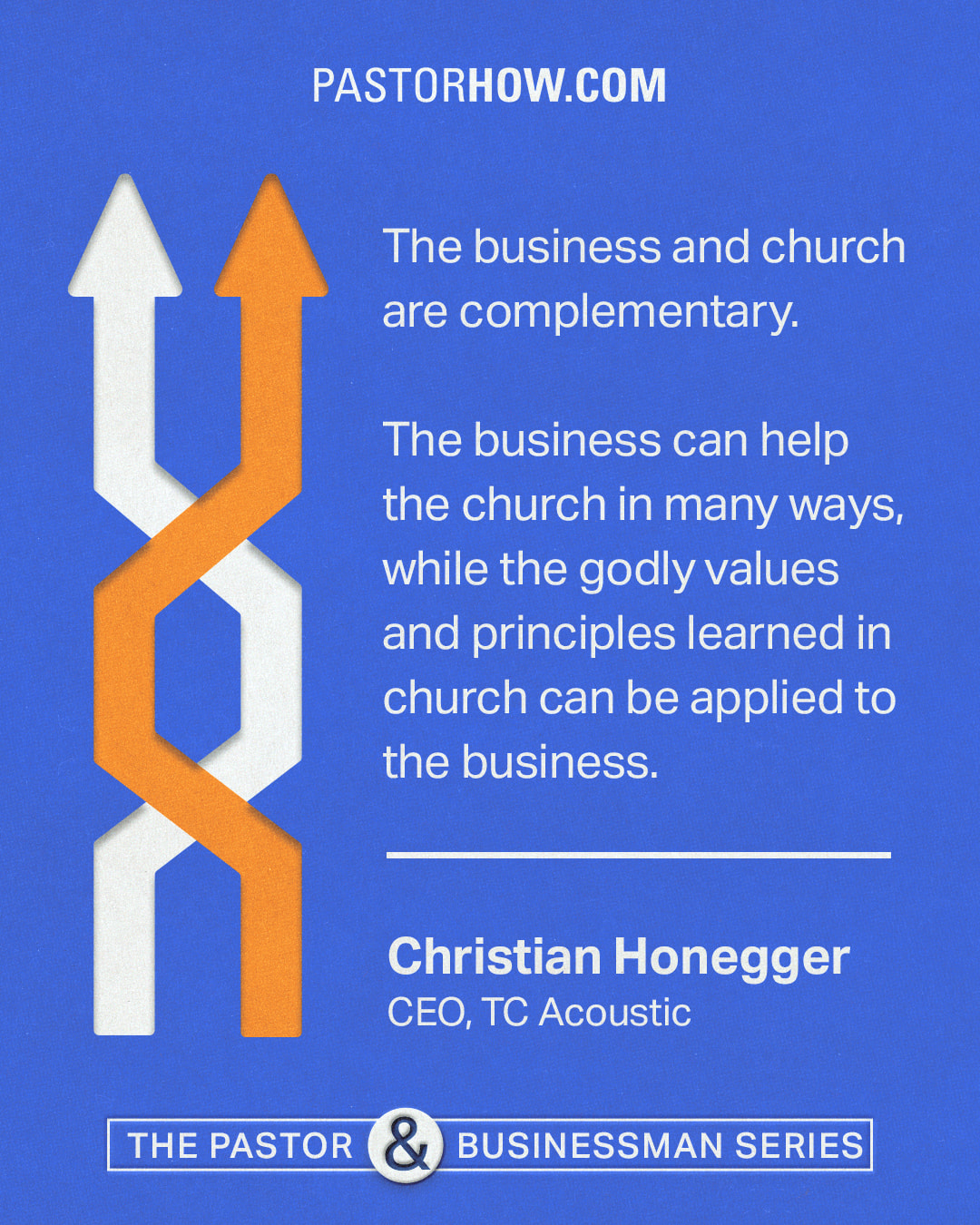
Receive leadership principles for building a Strong Church
English | 繁體中文
Length: 8-minute read
You’ve heard from the pastor who’s also a businessman. Pastor Tan Seow How (Pastor How) gave the lowdown on how he navigates both worlds of ministry and business at the same time. Read all about it in his article, My Journey to Becoming BOTH A Pastor & Businessman.
In this Q&A, we switch lenses and take a look from the business side of things. We chat with Christian Honegger, the CEO of a consumer electronics distributor based in Singapore.
Christian is also a senior leader in Heart of God Church. As someone whose life is lived between business and ministry, he shares his perspectives on how to have the best of both worlds.
My first business in Singapore was importing and distributing Swiss-made fitness shoes. They turned out to be quite a hit.
But three years into the business, the novelty started to wear off on me. Even though my business was successful, somehow I just wasn’t completely fulfilled in my personal life. I couldn’t shake off the feeling.
As a Christian who served actively in church, I had always felt the call to enter full-time ministry. Maybe, I thought, it was time to make the switch to my ‘real’ calling. Maybe that’s where I would find real fulfilment. So I handed my business over, and I made the big jump into full-time ministry in church. But soon after, I found myself longing to be in business. It was calling me back! I struggled to reconcile my two passions.
One day during a conversation with Pastor How and Pastor Lia, they offered a perspective that I was called to both worlds of church and business. I was a fish in water whenever I was working in one or the other, so God could effectively use me in these two fields at the same time. It was a lightbulb moment—a revelation that I have a dual calling on my life. The prospect was exciting.
I joined my pastors’ consumer electronics distribution business as the sales director in 2010 and later on took over as the CEO. Our revenue has since grown 17 times and we have expanded across Southeast Asia and Hong Kong with over 500 distribution points. Because of our growth, we have earned a place in the top 1% of SMEs (Small and Medium-sized Enterprises) in Singapore. We are also very proud to have made one of our principals the #1 earphone brand in Singapore for 7 consecutive years (based on Hardware Zone Reader’s Choice Awards). We are the only market in the world to have done so for this brand.

Christian with some of the team members from the business.
So here’s the twist: this all happened while I carried out the same responsibilities in church, which are equivalent to that of a full-time staff. In HOGC I am the Head of Technology, which means I drive the vision for how technology is adopted in all departments in our church. I am also the Global Relations Director, responsible for growing our relationships and partnerships with external organisations and leading the team that looks after special guests who visit our church. We have welcomed and hosted people such as best-selling author and speaker, John Bevere, as well as two-time Grammy Award winner Matt Redman. On the weekends you’ll find me with a group of 100 young adults and families whom I lead, minister to and counsel, together with my wife. Sometimes I preach the sermon during our weekend services. I am also a licensed wedding solemniser—imagine conducting your own employees’ wedding! (True story by the way).



Concurrent with the business, Christian holds key responsibilities in the church.
I have come to realise that both doing business and building the church are my callings. Yes, you can be called to both! It means that serving God at a high capacity isn’t limited to the pastors or people who work in church. Those in business like myself or those in the marketplace can and should be encouraged to do more in ministry. On the flip side, it means that pastors and church employees don’t have to be boxed in to doing just ‘church work’. It all starts by changing your mindset to a both-and, not either-or mentality.

The business and church are complementary. The business can help the church in many ways, while the godly values and principles learned and preached in church can be applied to the business.
The most obvious way of course, that the business benefits the church is financially.
Whenever we plan our annual budget, our starting point is how much we want to give away throughout the year. That then informs what our top-line should be.
When we were building the church facility in 2015, the business donated speakers for the lobby, corridors, hangout areas and restrooms. We even scrubbed the branding off to prevent any misunderstanding that we were advertising our products.
In July 2019, we ran a pastors’ conference in Hong Kong, where we gave away SG$11,000 worth of products to some pastors who attended. Altogether, in just the last 4.5 years (2015–2019) we have given away over SG$400,000 worth of products to bless other pastors and ministry leaders around the world.
When I joined the business, people naturally assumed I would reduce my responsibilities in church to that of a volunteer serving on the weekends. But because building the church and doing pastoral work is also my calling, I decided to keep the same high level of commitment in church. Basically, it means that I have effectively taken on two jobs, working 65–75 hours a week. I want to raise the standard of what it means to serve in ministry for CEOs and business leaders everywhere. And even though I continued the responsibilities of a full-time staff and work about 45 hours a week for church, I asked for a pay cut. The church can therefore expect a full-timer’s work out of me while I am paid like a part-time staff. I am happy to personally bless the church that way.
As for the church helping the business: I would look at it from the perspective that church instils the values that make me a better leader in business. It was in church where I learned the value of creating a healthy organisational culture.
To give you an idea, we instituted a weekly ‘good news meeting’, where employees gather to share positive stories from around the company. Whereas most companies would share such stories during an annual assembly (if they even do at all), we have made it a centerpiece in our operations. Every week, employees are injected with a dose of good news to fire them up. The stories could be sales related—a successful product launch in one of our markets or a raving customer review. They could also be about personal victories—a promoter making his first sale after a dry spell. There is a team on the ground that is assigned to compile the stories on a regular basis. The point here is the intentionality of getting everyone to inspire faith in each other, and this is something that I took away from church.
Here’s another principle we adopted: We don’t use people to build the business. We use the business to build people.
As with any business, it’s not always going to be smooth sailing. Sometimes the economy is bad, or the business doesn’t do well. Even in times of growth, cash can be tight. But every time that has happened, we have not compromised on treating our staff right. There was one year when it was not profitable, yet the owners (my pastors) still insisted on paying the staff bonuses. I was very inspired to find out later that the owners did not take director’s fees that season so that the employees could still receive their bonuses. We use the business to build our people.

Another value that I learned in church is to ‘be a brother’s keeper’. You’ll see this practised in our HR and Travel policies.
We often travel overseas for business. It’s common to travel alone, but our policy mandates that a second person of the same gender go as a chaperone. The reason is this: we know that if somebody falls, if somebody commits a sin, usually it happens when they’re alone overseas in another environment.
That applies to everybody in the company. When I travel with our marketing director who is a female, a third person will accompany us. Even if it costs more money to do this, we will never allow a situation where our employees’ integrity could be questioned.
One day the CEO of an American brand that we work with attended a service at HOGC. What he said after clearly summarises the approach that we have taken in the business:
“What I experienced at HOGC today was very revealing to me. The discipline, the execution at such a large scale in a church of this magnitude, it clearly spills over to the business side. More importantly, the business has a purpose well beyond just making money and today it became clear to me than it ever has before.
The team… is very clear on who they are and what it takes to be successful at this. [They] fill people with love and passion… the business and the church require both love and passion and I see it in both organisations.”
Because of practices learned in church, we were recognised across the region – we were listed on the Top 100 workplaces in Asia by Great Place to Work. They also awarded us for being the #2 Best Small Workplace in Singapore.
The funny thing is, to the business world, they would never guess that I work in church. And to church people, they would never think that I’m also the CEO of a business. It’s hard work! You need to be prepared to put in the hours.
At the core, it comes down to proper time management and the wisdom to prioritise the right things. Right now I have two young children. So it just means that I have no space for hobbies. I don’t have a man cave. I don’t go skiing in Switzerland. My life right now revolves around my family, church and business. I don’t have much time for myself and other things but this is my sacrifice in order to be bi-vocational and fulfil my dual calling. Honestly, no amount of money can make me work about 75 hours a week. It would have been much easier to just be a businessman, not serve in church and work long hours. But I am willing to live this life and pay this price because it is my calling. It is a sacrifice I am happy to make and I am satisfied with my choice. I love what I’m doing in church and the business.

Christian, with his wife who co-leads with him pastorally and their two adorable boys.
The beauty of working in both church and the business is the flexibility to prioritise where there is a need. I can be at a product launch one morning engaging our partners and customers, then be in the church office for meetings in the afternoon. At night, I’ll be leading connect groups.
To the business owners and entrepreneurs who feel called to the ministry: you are the keeper of your own time. You have more flexibility and autonomy than you think. It is hard work, but nothing could be more significant than living out your callings. Be creative, have faith, and trust that God will empower you.
The purpose of our business is to become everyone’s favourite company by building a prototype Christian business that will inspire many businesses to have a greater purpose than just making money.
The key ingredient is ‘Christian’, and I’m not being narcissistic!
There are many business people who say they are Christian businessmen, but very often they only want to use their Christianity to their advantage. In reality, when it comes to dollars and cents and the bottom line, they revert to being business people first.
We want to be a company where we are Christians first before we are business people. Where biblical values, godly principles and the church are non-negotiables. The question is, do the values in our business represent the Bible and Christian principles?
Are we willing to let go of our best salespersons because they violate our values? If we’re not willing to do that, we are not a Christian business.
Would you be willing to take a financial loss for the sake of not violating your Christian values? At one point we had the opportunity to become a distributor for a popular gaming brand. It had potential for good sales. But it conflicted with our vision and values that youths should focus on studies, building the church and loving their families. So we turned it down.
It’s really easier said than done. Because unless you’re willing to lose money over your Christian values, you are not a Christian business.
We build a Christian business from the inside out, not the outside in.

We don’t hang crosses on the wall or put Bible verses in our emails, so very often it’s only after some time that people figure out we are Christians. But when they do find out, some global executives have so respected our Christian values that they started going back to church. Some who were not Christians were inspired to go to church and received Jesus into their hearts.
Being a Christian business is more than just about where the money goes or the office ornaments. At the end of the day, our business must touch others and bring them closer to God.
Upholding these Christian values has impacted so many customers that we were voted best customer service in Singapore in a survey by the national paper.
If you want to know more about the principles and how we apply them, read this article.
Let me address the readers who are involved in ministry, church leaders and even pastors. You may have business people in your church. They may do very well in their field. But as a businessman, I can personally say that even successful people need a purpose and meaning in their lives. Just being successful is not going to be enough.
As church leaders, you need to give them a vision of what else they can do in the church beyond giving financially. Every business person, no matter how much money they make, needs a purpose. They are longing to make a difference in the church. They want to build something that will outlast their lives and you are the right person to give them the opportunity.
Tell them that you have something for them to do and how they can be involved in your church. Maybe they can hire people from the church and give them flexible hours to serve. Or they themselves could fill in key roles in your church like what I’m doing.
They can do more than just volunteer on the weekends. When I started working in the church, I never thought that a church would require so many disciplines beyond preaching on weekends and solemnising weddings. You need people who are experts in management, operations, IT, HR, accounting and more. All of these operate during the weekdays!
There is a power when the business people are plugged into the church. When it comes down to significance and purpose, they won’t have it unless they are really involved in your church.
For the business people out there, you can have success and significance. Embrace the paradigm shift of doing both business and ministry work. It is possible. I’ve shown you a living model, and many other business leaders are doing the same. We are operating in our full calling because of it. If I only had either the business or church, I’d short-change myself of what God has called me to do. I’m standing by this verse:
Colossians 3:23–24 (The Message): “Do your best. Work from the heart for your real Master, for God, confident that you’ll get paid in full when you come into your inheritance. Keep in mind always that the ultimate Master you’re serving is Christ.”
My challenge to you is to set a new benchmark for business leaders in BOTH realms of business and ministry. At the end of the day, there may be two realms, but God is the Master of both. Let’s serve Him with our best!

Receive leadership principles for building a Strong Church
It was so nice and I would pray the Lord may bring more blessings. Deut 28 1-10
Extremely happy people get to read about this. Working in the company, we can now dream ‘both and’ not just ‘either or’. On top of that, we get to live out our Christian values and not compromise on them because the company embodies the same values. In the 3 years I’ve worked in TC, I’ve never been caught in a position where I had to choose between being corporate or Christian – no politics or backstabbing, always people and others, faith and good news etc. To see that this is possible and to be part of a company that strives to make a Christian business possible is such a privilege! All business people should read this article, you will be very inspired and challenged!
I am privileged to witness & experience firsthand how “being Christian is the key ingredient” at TC (our company). In my 5+ years in the company, I’ve seen so many decisions (from HR, to Sales, to Business Development activities) made because of Christian values and convictions, over profitability or what is “good” / “logical” for the business.
Take for example, my insurance plan. TC actually pays for my personal health insurance. This plan is tied to my name, not the company name. (So even when employees leave TC, they can still enjoy the insurance plan.) This is far more expensive than group / company insurances, which is the common industry practice. When you do the sums, it totally does not make sense. But, in TC, our owners genuinely care. We have this mantra in TC that “people are above profits”.
Coming from an MNC background (before joining TC), it was so refreshing and so inspiring that I can belong to a company where the bottomline is not the most important measure of success.
Still grateful that I can be part of TC! Having BOTH success & significance is possible.
Being an employee in TC, I really agree with this article wholeheartedly. All that has been taught and shared in service and church are exactly like how it is lived out in the business as well. The Wednesday “good news meeting” reminds us why we do what we do, the heart and essence of TC – people over profits and christian prototype business!
Reading this article, it really lifted my mindset about both doing well at work and doing good in church. Both together are so possible! So inspired and challenged! Love the 2nd last sentence – God is the Master of both. It is not “either or”but “both and”!